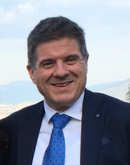IAHR Executive Committee 2023-2025 | Candidate Statement: Corrado Gisonni
Corrado Gisonni - Department of Engineering, Università della Campania ‘Luigi Vanvitelli’
Candidate for:
President
Biography and IAHR Commitments
 Since 2012, I am Full Professor and Chair of Hydraulic Engineering and Hydraulic Structures at the University of Campania ‘Luigi Vanvitelli’ (formerly, Second University of Naples, Italy), where I serve as leader and manager for various academic tasks, including President of the Academic Board of Civil and Environmental Engineering (2016-2020).
Since 2012, I am Full Professor and Chair of Hydraulic Engineering and Hydraulic Structures at the University of Campania ‘Luigi Vanvitelli’ (formerly, Second University of Naples, Italy), where I serve as leader and manager for various academic tasks, including President of the Academic Board of Civil and Environmental Engineering (2016-2020).
I am actually Vice-President of the Italian Group on Urban Hydraulics (CSDU) and in 2019 was engaged by the Italian Prime Minister to solve one of the most critical hydraulic and environmental emergencies in Central Italy (around 180 M€ work amount).
My main research interests relate to urban hydraulic infrastructures, sewer hydraulics and river engineering, mainly investigated via experimental methods.
I joined IAHR in 1992 (as Ph.D. student at the University of Naples ‘Federico II’) and attended my first IAHR World Congress in London UK (1995).
From 2003 to 2007, I served as member of the IAHR Technical Committee ‘Hydraulic Structures’. In 2005, I was elected member of the Leadership Team of the IAHR European Division, acting as Secretary (2010-2014), Vice-Chair (elected, 2014-2016) and Chair (elected, 2016-2022).
Beside these commitments, I am Associate Editor of the Journal of Applied Water Engineering and Research (jointly issued by IAHR and the World Council of Civil Engineers, WCCE) since 2014.
Election Statement
It is a great privilege and honour to be selected by the Nominating Committee for the election for IAHR President. By incidence this opportunity came on the 250th anniversary of the death of Luigi Vanvitelli, the designer of the famous Royal Palace in Caserta (under the Bourbon King Charles) and the related marvellous water supply system.
The first decades of the third Millennium are characterized by emerging and increasing attention to water as a primary need for life, as well as potential source of natural disasters. In this context, IAHR must play a steering role to support world and regional institutions, by addressing their future agenda and actions through an effective transfer of the scientific results toward practical solutions.
This goal may be achieved through a new global strategic plan of IAHR, based on the following items:
Enhancement of the network of knowledges, also with significant attention to professional communities. A closer and more collaborative interaction research and practice appears to be indispensable to gain visibility and attract new IAHR members from non-academic fields. In my view, IAHR needs to establish stable alliances with kindred water associations, also by promoting inter- and trans-disciplinary activities.
Closer contact with Governmental and Public Agencies. It is important to increase the impact of IAHR on decision makers, trying to address their policies and decisions dealing with water and hydro-environmental issues.
Upgrading of regional diversity of IAHR membership. The actual geographical distribution of IAHR members excludes several countries, some of which may potentially contribute to the mission of the Association. In my view, it is a primary concern to attract and involve new members from under-represented areas, such as Africa, Middle East and Eastern Europe.
Improvement of the financial situation of the Association. Promoting and finalizing IAHR’s activities needs for funding that cannot rely exclusively on membership fees.The future IAHR’s leadership will have to run the Association on a business base, still preserving its native DNA.
Combination of tradition and innovation. We are proud members of the oldest international research association (1935) focusing on the water engineering domain. When driving a luxury car, the driver must carefully look ahead (the future), trying to choose the best trajectory toward the final target, by accounting for the advantages of new and alternative routes (innovative technologies and methods). Nevertheless, an expert pilot should never forget to glance at the rear-view mirror (the lessons from the past), to prevent any potential danger.
In conclusion, I would like to stress my primary commitment toward IAHR: to continuously contribute to the future development of our Association, based on my past experience in water engineering, hydro-environmental research and education programs.